Neolithic age ii - Study guides, Class notes & Summaries
Looking for the best study guides, study notes and summaries about Neolithic age ii? On this page you'll find 34 study documents about Neolithic age ii.
Page 2 out of 34 results
Sort by
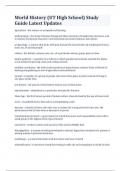
-
World History (UT High School) Study Guide Latest Updates
- Exam (elaborations) • 8 pages • 2024
-
Available in package deal
-
- $7.99
- + learn more
World History (UT High School) Study Guide Latest Updates agriculture - the science or occupation of farming anthropology - the study of human beings and their ancestors, through time and space, and in relation to physical character, environmental and social relations, and culture archaeology - a science that deals with past human life and activities by studying the bones, tools, etc. of ancient people culture - the beliefs, customs, arts, etc., of a particular society, group. place ...
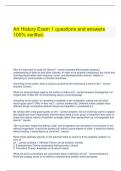
-
Art History Exam 1 questions and answers 100% verified.
- Exam (elaborations) • 7 pages • 2023
-
- $10.99
- + learn more
Art History Exam 1 questions and answers 100% verified. Why is it important to study Art History? - correct answers.Will broaden anyone's understanding of both art and other cultures. In order to be properly understood, the visual arts must be placed within their historical, social, and developmental contexts. Helpful in attempting to communicate a Christian worldview. According to the author, what is a key to unraveling the meaning of a work of art? - correct answers....
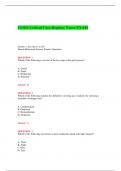
-
CCRN Critical Care Register Nurse EXAM
- Exam (elaborations) • 111 pages • 2024
-
- $12.99
- + learn more
CCRN Critical Care Register Nurse EXAM Section 1: Sec One (1 to 20) Details:Behavioral Science Practice Questions QUESTION: 1 Which of the following is not one of the key steps in the grief process? A. Denial B. Anger C. Bargaining D. Rejection Answer: D QUESTION: 2 Which of the following matches the definition: covering up a weakness by stressing a desirable or stronger trait? A. Compensation B. Projection C. Rationalization D. Dysphoria Answer: A ...
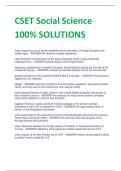
-
CSET Social Science 100% SOLUTIONS
- Exam (elaborations) • 26 pages • 2024
-
- $11.49
- + learn more
CSET Social Science 100% SOLUTIONS most frequent source of conflict between church and state in Europe throughout the middle ages - ANSWER the doctrine of papal supremacy Latin American revolutionaries of the early nineteenth century drew intellectual inspiration from - ANSWER political ideals of the Enlightenment important consequence of western European industrialization during the first half of the nineteenth century - ANSWER a division for families between home life and work life ...

-
AP World History Exam Study Guide Questions and answers, 100% Accurate, graded A+
- Exam (elaborations) • 19 pages • 2023
-
Available in package deal
-
- $10.49
- + learn more
AP World History Exam Study Guide Questions and answers, 100% Accurate, graded A+ Civilization - -An ambiguous term often used to denote more complex societies but sometimes used by anthropologists to describe any group of people sharing a set of cultural traits. Foragers - -People who support themselves by hunting wild animals and gathering wild edible plants and insects. Cuneiform - -A system of writing in which wedge-shaped symbols represented words or syllables. It originated in M...
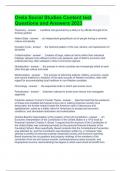
-
Orela Social Studies Content test Questions and Answers 2023
- Exam (elaborations) • 13 pages • 2023
-
Available in package deal
-
- $23.49
- + learn more
Orela Social Studies Content test Questions and Answers 2023 Theocracy a political unit governed by a deity (or by officials thought to be divinely guided) Nation-State an independent geopolitical unit of people having a common culture and identity Dynastic Cycle the historical pattern of the rise, decline, and replacement of dynasties Collectivization Creation of large, state-run farms rather than individual holdings; allowed more efficient control over peasants; part ...

-
NES - Elementary Education Subtest I - U.S. & World History
- Exam (elaborations) • 6 pages • 2022
-
Available in package deal
-
- $6.49
- + learn more
Era 1 correct answer: - the beginnings of human society Era 2 correct answer: - early civilizations and the emergence of pastoral peoples (4000-1000 BCE) Era 3 correct answer: - classical traditions, major religions, and giant empires (1000 BCE-300 CE) Era 4 correct answer: - expanding zones of exchange and encounter (300-1000 CE) Era 5 correct answer: - intensified hemispheric interactions (1000-1500 CE) Era 6 correct answer: - the emergence of the first global age (1450-17...
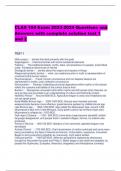
-
CLAS 104 Exam 2023-2024 Questions and Answers with complete solution test 1 and 2 T
- Exam (elaborations) • 12 pages • 2023
-
- $13.49
- + learn more
CLAS 104 Exam Questions and Answers with complete solution test 1 and 2 TEST 1 Myth proper - stories that deal primarily with the gods Saga/legend - Historical stories with some fantastical elements Folklore - The traditional beliefs, myths, tales, and practices of a people, transmitted orally. Fantastical adventures of heroes Etiological stories - stories about the origins and causes of things Allegorical/symbolic stories - what. you read/encounter in myth is representative of univer...
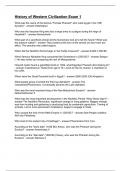
-
History of Western Civilization Exam 1
- Exam (elaborations) • 8 pages • 2024
-
- $10.49
- + learn more
What was the name of the famous "Female Pharaoh" who ruled egypt in the 18th dynasty? - answer-Hatshepsut Who was the Assyrian King who lost a large army to a plague during the reign of Hezekiah? - answer-Sennacherib What part of a sacrificed animal did the Sumerians look at to tell the future? What was the practice called? - answer-They looked at the liver of the animal (no two livers are alike). This practice was called augury. When did the Neolithic Period begin in the Fertile Cres...
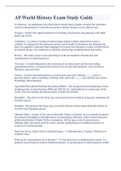
-
AP World History Exam Study Guide Latest Updates
- Exam (elaborations) • 15 pages • 2023
-
Available in package deal
-
- $8.49
- + learn more
AP World History Exam Study Guide Civilization - An ambiguous term often used to denote more complex societies but sometimes used by anthropologists to describe any group of people sharing a set of cultural traits. Foragers - People who support themselves by hunting wild animals and gathering wild edible plants and insects. Cuneiform - A system of writing in which wedge-shaped symbols represented words or syllables. It originated in Mesopotamia and was used initially for Sumerian and Ak...

That summary you just bought made someone very happy. Also get paid weekly? Sell your study resources on Stuvia! Discover all about earning on Stuvia


